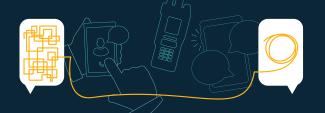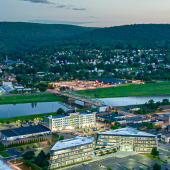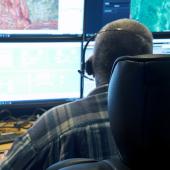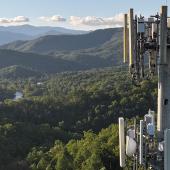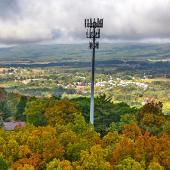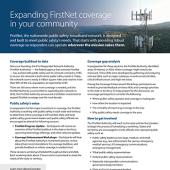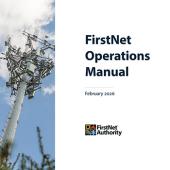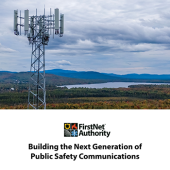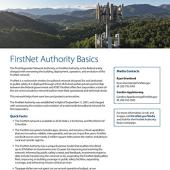FirstNet is dedicated to bringing emergency responders their nationwide, interoperable public safety communications network along with the innovative tools and technology they need to serve America’s communities. To deliver on this mission, we make it a priority to involve law enforcement, EMS, and fire personnel in every step of the way ensuring public safety has a voice in the development, deployment and improvement of their network. As a vital member of our Public Safety Advocacy Team, Senior Fire Services Advisor Mike Worrell, travels the nation engaging with local, state and federal fire service personnel to ensuring the network meets their operational needs now and in the future.
For Mike Worrell, becoming a first responder was personal. His brother was only 25 when he died unexpectedly of a heart ailment. The first responders who rushed to help his brother were exceptionally kind, Mike said, and he’ll never forget the way they treated him and his family. For someone interested in many different careers, that experience, ultimately, led Mike Worrell to becoming a firefighter.
Mike served 29 years with the Phoenix Fire Department, his last position being Technical Services Division Chief. He was also a member of the National Urban Search and Rescue Incident Support team, and a qualified Communications Unit Leader and Communications Technician instructor. Before he joined the fire department, Mike was an Electronics Technician in the Navy’s Submarine Service.
Mike enjoys explaining to first responder groups around the country how FirstNet provides voice and data communications and will soon enable them to exchange visual images and real-time video with other responders both before and during emergencies. He tells them that when they’re responding to catastrophic scenes in other jurisdictions, they’ll be better informed when they arrive, because FirstNet will provide all responders with better situational awareness. This allows for more informed decisions, making guesswork a thing of the past.
Although he specializes in technical communications, Mike knows it takes a lot of heart to be a first responder, and this comes through in his talks. One of his favorite stories involves responding to an elderly woman’s call when her husband fell in the shower. Worrell and his crew helped the man up, and after finding his blood pressure was extremely high, suggested he go to the hospital. This suggestion was met with extreme resistance. Worrell and his crew stayed trying to convince them to go to the hospital. They had been married for over 60 years and the wife was convinced that if her husband went to the hospital he would never come home. Even calling the Fire Department Chaplain didn’t help. She told the chaplain that the meanest people she ever met were in church and that she only trusted the firefighters and promptly hung up on him. The crew finally convinced them that the best decision was to go to the hospital, but they only agreed if the crew stayed with them to guide them through a difficult time. The crew stayed with them until they were comfortable with the situation, and out of state family reassured them that all would be okay. He later learned that the woman called the fire chief, expressing that she wanted to leave her house to the fire department.
Worrell still smiles when telling the story, and says his work was simply about being nice. He knows there are a million first responder stories like this that the public will never hear because they don’t make the news.
“Because first responders do so much, they deserve to be safer on the job, so they can all go home at the end of their shift” Worrell said. “They absolutely deserve FirstNet.”
We had the opportunity to talk with Mike recently about his work with FirstNet.
What brought you to the First Responder Network Authority?
Mike Worrell- Being part of a huge transformational change in public safety is what got me here. FirstNet is an enabling technology that will provide many benefits to the responder community, and things we can only imagine on the job today will be a reality in a few years.
What was your first public safety role, and what was your latest public safety role?
Mike Worrell- I was hired by the Phoenix Fire Department as a civilian to maintain the Computer Aided Dispatch system, mobile data equipment, communications equipment, and medical equipment. I worked on anything that had batteries, beeped, honked or squawked. Over several years I witnessed how the fire service has an impact on the community and the lives of individuals in their time of greatest need and how the fire department is the agency of last resort. I made the decision to change career paths and become a firefighter. After 29 years with the department, I ended my career as the Division Chief of Technical Services.
What excites you most about a post-FirstNet world?
Mike Worrell- I’m most excited that FirstNet will provide firefighters with technologies to decrease injury and line of duty deaths. As simple as it sounds, I’m excited about the ability to communicate effectively on the fire ground and have the capabilities you might see in a video game i.e., heads up display of thermal imaging, environmental conditions, situational awareness, location, and biometric monitoring. The Internet of Things will give responders things like sensor technologies to detect cardiac events and record exposure to carcinogens. These are some of the biggest health risks to firefighters.
When future generations of firefighters take Mission Critical Data for granted and think the fire fighters of this era were crazy for fighting fires without the information provided by FirstNet, we will have done our job.
What do you wish public safety understood about FirstNet? (In other words, what's a common myth and let's debunk it.)
Mike Worrell- This isn’t really a myth, but it is more of a culture in the fire service. Firefighters often do not see technology as an important element of the job. They need to be reminded that they depend on computers to receive dispatch information from a mobile device, use digital mapping to route to calls, pull up building pre-plan information, use complex radio systems, and the list goes on. They need to see the role that technology plays in making them safer by giving them information to better assess risk, respond to calls and allow them to return safely. Overcoming this cultural belief that advanced technology isn’t a critical piece of their jobs will help the fire service understand why FirstNet is so important.
How has first responder/public safety technology evolved since you held your first public safety role?
Mike Worrell- Everything seems to have gotten smaller and/or more rugged with more complexity and capability since I joined this profession. Now responders are armed with smaller dual-band ruggedized trunked radios, thermal imaging cameras that you can hold in the palm of your hand, better breathing apparatuses and certainly better protective equipment.
If you could have a dream public safety app, what would it be?
Mike Worrell- One of the hardest decisions for a fire crew are lunch and dinner decisions. A public safety “Yelp” app that gave you locations for good food, big quantities and cheap prices would be great. An added bonus would be if the app could make a decision for your crew when no one could agree on one place. Seriously, I hope that one day we see an app like “Google Cards” that learns what information responders need and presents it right when they need it.
Who do you admire most in public safety today -- and why?
Mike Worrell- I admire all the men and women that leave their families at home each shift to protect us and the families that loan their loved ones to “the public”. We mustn’t forget there are many roles to provide public safety. This includes first responders, dispatchers, the technicians who keep the calls coming in and the radios working, the mechanics that keep the wheels rolling, and the list goes on and on. It is truly a team effort!
More from FirstNet in the video below:
Contact Mike Worrell, Senior Fire Services Advisor, at Mike.Worrell@firstnet.gov or call 202-815-8455





